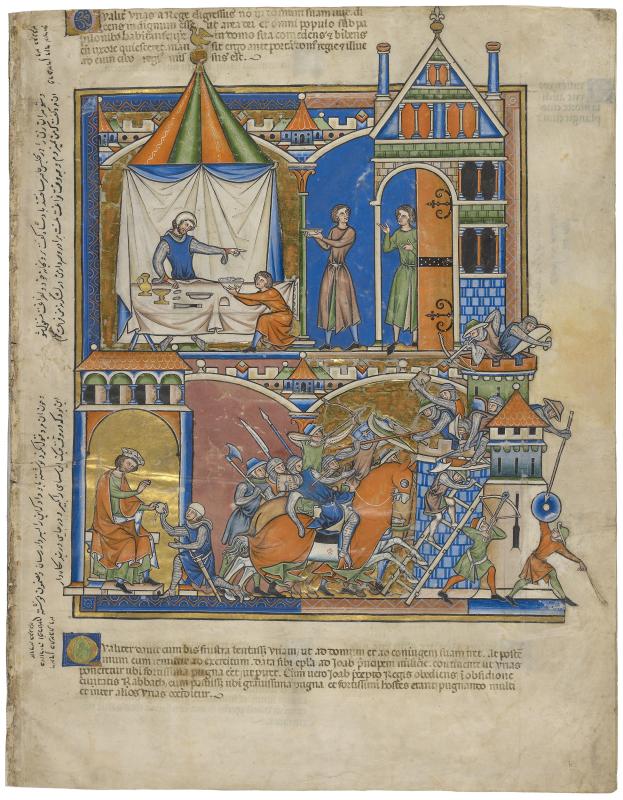
Uriah Refuses to Return Home, Uriah is Slain
Old Testament Miniatures with Latin, Persian, and Judeo-Persian inscriptions
Purchased by J.P. Morgan (1867–1943) in 1916
Folio 42r (Latin)
Upper half: How, after he had departed from the king, Uriah did not go home, saying that it was disgraceful that while the ark of God and all the people were dwelling in tents he was eating and drinking at home and lying down with his wife. Therefore he stayed in front of the palace’s gate and food was sent to him from the king. (2 Samuel 11: 8–9)
Lower half: How, when David had twice attempted in vain to have Uriah go to his house and wife, he then sent him back to the army with a letter to Joab, the army’s captain, ordering to assign him to the place the battle was most fierce, that he might die. When Joab, in obedience to the king’s command, had indeed assigned him to the siege of Rabbath where the battle was most fierce and the enemy most strong, Uriah and others died fighting. (2 Samuel 11: 10–17)
Folio 42r (Persian)
Upper left margin: They brought the woman’s husband to the court. The king said, "Go to your house and be at leisure." The man said, "I shall not go and this is not my leisure time [when] my brother and commander are in the army; I want not leisure."
Lower left margin: And when the man refused, he [David] gave him a letter to deliver to the commander. And the letter’s content was this, "Take this soldier during the war and keep him bound somewhere."
Folio 42r (Judeo-Persian)
Upper left margin, corner: David’s sending of Uriah off to war.
Lower left margin, bottom: [David’s] giving of the letter to Uriah and sending him off to war.
Uriah Refuses to Return Home
Uriah will not obey David's orders to return home, for to do so in a time of war would bring shame upon him. He sets up his eagle-topped pavilion before the king's house and enjoys a rich feast provided by the king. David's grand doorway is crowned by a finial topped by a royal fleur-de-lis. (2 Kings 11:7–9)
Uriah is Slain
David, unable to convince Uriah to return home, sends him back to the Israelite camp with a sealed letter for Joab. Joab is instructed to reassign Uriah to the fiercest part of the battle. Uriah is posted to the front lines of the Israelite siege at Rabbah, where valiant men defend the citadel. There he is struck by a bolt fired from an enemy crossbow and killed. (2 Kings 11:14–17)
